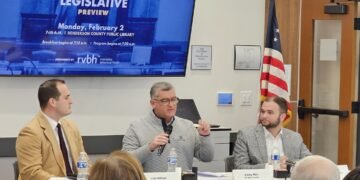Jonathan Haidt opens his book “The Anxious Generation: How the Great Rewiring of Childhood Is Causing an Epidemic of Mental Illness” with a thought experiment he calls growing up on Mars.
A billionaire is choosing candidates for the first human settlement on Mars. Your 10-year-old daughter, because of her enthusiasm, brilliant academics and genome, is selected. All her friends are going! (You are uncomfortable as you do not recall giving permission for her to be considered.) As a responsible parent, though, you want to learn about the effects of radiation on a pre-pubescent body, the effects of low gravity on developing muscles and, most importantly, when would these pioneers including your daughter be coming home? Of course, there are no reliable answers. No parent in their right mind would consent to this experiment.
Haidt writes that Generation Z became the first generation in history to go through puberty with a portal in their pockets that called them away from people nearby and into an alternative universe that was exciting, addictive, unstable and, as this book seeks to prove, unsuitable for children and adolescents.
Sort of like sending our children to Mars.
Simply, Haidt’s premise is we have overprotected our children in the real world and under protected our children in the virtual world.
Why should we care?
Here are some troubling statistics for your review. Haidt graphs the precipitous rise of anxiety, suicide, depression, visits to the ER and more during the time span 2010-2015. This time frame roughly corresponds to the Generation Z cohort, a group commonly described as having been born between 1997-2012 who for the first time in history had access to smart phones, social media, front-facing cameras and unlimited data usage.
The consequences seem to be a disconnected, anxious generation who are more comfortable in the virtual world than interacting with family and peers. Many have an online image to manage and spend seven-hours-plus per day doing just that. My guess is you have witnessed the pull of infinite or doomsday scrolling and have been dismayed at the addictive nature of algorithms which know your likes and search history.
Once again, why should we care? I am a member of a small book club which decided to tackle this book. It made us anxious. As we digested the contents, we felt this message needed a bigger platform. We invited parents, grandparents and Gen Z’ers to give their input. We had robust, troubling and stimulating conversations.
From this meeting, we suggested three goals:
1) raise awareness of the dangers of smart technology, including social media, for developing children
2) continue a conversation through small groups meeting in homes, schools, churches, non-profits and the community
3) provide a support system for parents in need of good ideas.
Here’s our challenge to you: If you have children, grandchildren or care about the mental health of young people in Henderson, you have a voice in this conversation. Read this book (or others) and listen to the various podcasts of which Haidt is the featured guest. These include Joe Rogan, Huberman Lab, Making Sense, Armchair Expert, Lex Fridman and TED Talks Daily Book Club. Discuss ideas with groups in your sphere of influence. As parents of young children, wrestle with the decisions you will make concerning smart phone access. And, re-evaluate your own smart phone use.
Haidt’s last chapter is titled “Collective Action for Healthier Childhood.” He is hopeful that it’s not too late to pull back from the harms of this technology. His challenge for tech companies and governments is to enact more robust protections for our youngest citizens. His solution is collective action because more voices mean more potential for change and action.
In summary, Haidt’s foundation for a healthier childhood includes the following:
• No smartphones before high school (roughly age 14). Notice a distinction is made between smart phones and Gab phones with no internet access and limited apps.
• No social media before age 16.
• Phone-free schools. This also includes smart watches. These technologies should be locked and inaccessible during the school day.
• More robust play and childhood independence. Haidt advocates for play-based childhoods versus phone-based childhoods.
If you would like to participate in a community conversation, please feel free to join us. Our next meeting is 9 a.m. Monday, April 21 at the Presbyterian Church, 100 S. Main Street (across from the Library). We would encourage you to read “The Anxious Generation” or listen to a podcast or book review.
Please let us know if you will be attending at annshodge@gmail.com.
Ann Hodge is a wife, mother of six, and grandmother of five who is a member of a small group called the Bookies that meet on an irregular basis to discuss great books and literature.



















